部分双音节和多音节词的比较级
比较级

比较级(Comparative Degree )在英语中通常用下列方式表示的词:在形容词或副词前加more(如more natural,more clearly )或加后缀-er(newer,sooner )。
典型的是指形容词或副词所表示的质、量或关系的增加。
英语句子中,将比较两个主体的方法叫做“比较句型”。
其中,像“A比B 更……”的表达方式称为比较级。
组成句子的方式是将形容词或副词变化成比较级的形态。
目录1构成2用法1 2.1 一般1 2.2 特殊3基本句型1 3.1 同级比较1 3.2 降级比较4特殊句型5注意6考题思路7重要考点1构成⒈单音节形容词和部分双音节词,一般在词尾加-er。
2. 以字母e结尾的词,在词尾加-r。
3. 重读闭音节词词尾只有一个辅音字母时,先双写该辅音字母,再加er。
4. 以"辅音字母+y“结尾的双音节词,先把”y“改为”i“,再加-er。
5. 多音节词和部分双音节词,在词前加”more“。
6. 部分形容词和副词的比较级是不规则的,如:good/well-better,bad/badly-worse。
7. 由“动词+后缀-ing/-ed”构成的形容词,在词前加more构成比较级。
如:interesting-more interesting,bored-more bored。
8. 由“形容词+后缀-ly”构成的副词,在该副词前加more构成比较级。
如:slowly-more slowly,happily- more happily。
2用法一般1. 表示"比...更", 用比较级形容词+than+比较成分, than后主词的述语动词往往省略, 非正式用法的than后的人称代名词可用受格。
He is younger than me.他比我年轻。
I am a better swimmer than he(him).我游泳比他好。
2. 表示"较...低; 不及..."用less+原级形容词+than+比较成分。
形容词变比较级的变化规则
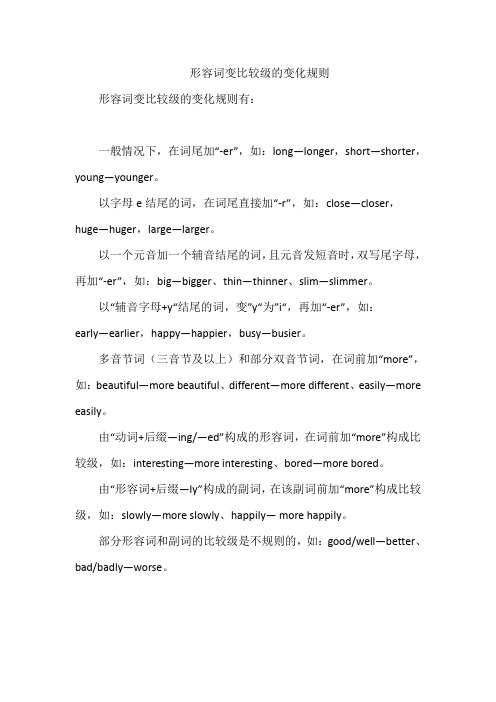
形容词变比较级的变化规则
形容词变比较级的变化规则有:
一般情况下,在词尾加“-er”,如:long—longer,short—shorter,young—younger。
以字母e结尾的词,在词尾直接加“-r”,如:close—closer,huge—huger,large—larger。
以一个元音加一个辅音结尾的词,且元音发短音时,双写尾字母,再加“-er”,如:big—bigger、thin—thinner、slim—slimmer。
以“辅音字母+y“结尾的词,变”y“为”i“,再加“-er”,如:early—earlier,happy—happier,busy—busier。
多音节词(三音节及以上)和部分双音节词,在词前加“more”,如:beautiful—more beautiful、different—more different、easily—more easily。
由“动词+后缀—ing/—ed”构成的形容词,在词前加“more”构成比较级,如:interesting—more interesting、bored—more bored。
由“形容词+后缀—ly”构成的副词,在该副词前加“more”构成比较级,如:slowly—more slowly、happily— more happily。
部分形容词和副词的比较级是不规则的,如:good/well—better、bad/badly—worse。
英语形容词比较级的用法与组成规则2

一、加后缀-er和-est构成 单音节和部分双音节形容词加后缀–er和–est构成比较级和最高级。
如: 原级比较级最高级 tall(高的) taller tallest quiet(安静的) quieter quietest narrow(狭窄的) narrower narrowest 【注意】(1) 若原级以字母e结尾,则只加-r和-st。
如:fine—finer—finest。
(2) 若原级以“辅音字母+y”结尾,则应将y改为i,再加-er和-est构成比较级和最高级。
如:dry—drier—driest。
(例外。
如:shy—shyer—shyest) (3) 若原级为重读闭音节结尾,且末尾只有一个辅音字母,则双写这个辅音字母后再加词尾-er和-est构成比较级和最高级。
如:big—bigger—biggest。
二、在其前加more和most构成 多音节和部分双音节形容词在其前加more和most构成比较级和最高级。
如: 原级比较级最高级 difficult(困难的) more difficult most difficult dangerous(危险的) more dangerous most dangerous 【注意】(1) 有的双音节形容词(如clever, common, gentle, handsome, happy, narrow, polite, quiet, shallow, simple, stupid)可以有两种方式构成比较级和最高级。
如:clever — cleverer / more clever — cleverest / most clever 等。
(2) 某些带有否定前缀un-的三音节形容词(如uncommon, unhappy, unpleasant, untidy等)可以用两种比较等级形式。
如:unhappy—unhappier / more unhappy — unhappiest / most unhappy。
多音节比较级

写出下列词的比较级和最高级。 写出下列词的比较级和最高级。 famous excited friendly popular dangerous difficult more famous most famous more excited most excited more friendly most friendly more popular most popular more dangerous most dangerous more difficult most difficult
有些双音节词既可以加er, 有些双音节词既可以加 est 也可以在 前面加more 和most: 前面加 quiet quieter, quietest, more quiet, most quiet clever cleverer, cleverest more clever, most clever simple simpler, simplest more simple, most simple
important more important, most important
有部分双音节词在前面加more 和most: 有部分双音节词在前面加 often more often, most often
modern more modern, most modern helpful more helpful, most helpful serious more serious, most serious patient more patient, most patient
多音节词的比较 级和最高级
单音节和部分双音节词比较级和最 高级的构成一般是在词尾加er 或est, 高级的构成一般是在词尾加 但一般三个音节以上的形容词或副 词比较级和最高级要在其前面加 more 或 most来构成。 来构成。 来构成
比较级的形成和比较对象的选择
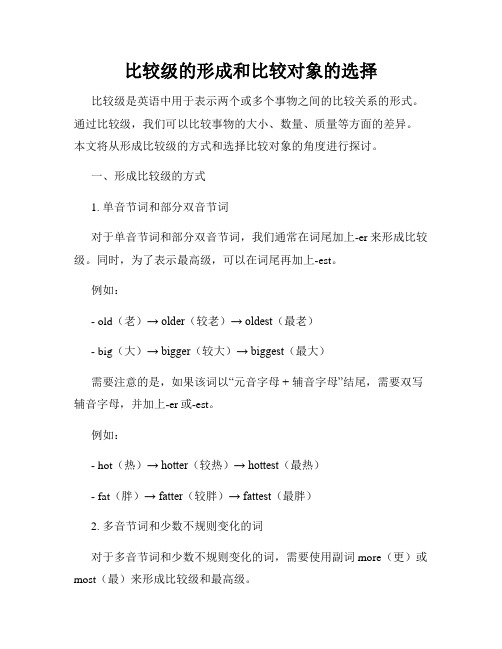
比较级的形成和比较对象的选择比较级是英语中用于表示两个或多个事物之间的比较关系的形式。
通过比较级,我们可以比较事物的大小、数量、质量等方面的差异。
本文将从形成比较级的方式和选择比较对象的角度进行探讨。
一、形成比较级的方式1. 单音节词和部分双音节词对于单音节词和部分双音节词,我们通常在词尾加上-er来形成比较级。
同时,为了表示最高级,可以在词尾再加上-est。
例如:- old(老)→ older(较老)→ oldest(最老)- big(大)→ bigger(较大)→ biggest(最大)需要注意的是,如果该词以“元音字母 + 辅音字母”结尾,需要双写辅音字母,并加上-er或-est。
例如:- hot(热)→ hotter(较热)→ hottest(最热)- fat(胖)→ fatter(较胖)→ fattest(最胖)2. 多音节词和少数不规则变化的词对于多音节词和少数不规则变化的词,需要使用副词more(更)或most(最)来形成比较级和最高级。
例如:- beautiful(美丽)→ more beautiful(更美丽)→ most beautiful(最美丽)- good(好)→ better(较好)→ best(最好)3. 形容词前加上more(更)或most(最)当形容词的词尾是-y、-ow、-er、-le等时,我们需要在其前面添加more或most来构成比较级和最高级。
例如:- funny(有趣)→ more funny(更有趣)→ most funny(最有趣)- narrow(狭窄)→ more narrow(更狭窄)→ most narrow(最狭窄)二、选择比较对象1. 指同一个事物的不同方面比较当我们需要比较同一个事物的不同方面时,可以使用形容词的比较级。
例如:- My laptop is faster than yours.(我的笔记本比你的快。
)- Her voice is louder than mine.(她的声音比我的大。
形容词比较级与最高级:勇敢
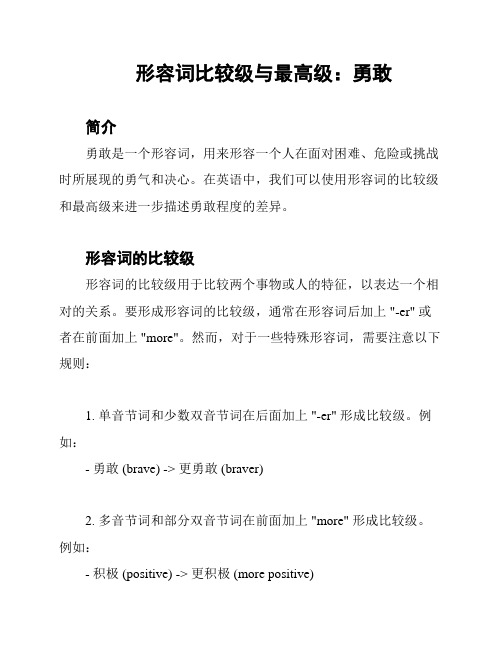
形容词比较级与最高级:勇敢简介勇敢是一个形容词,用来形容一个人在面对困难、危险或挑战时所展现的勇气和决心。
在英语中,我们可以使用形容词的比较级和最高级来进一步描述勇敢程度的差异。
形容词的比较级形容词的比较级用于比较两个事物或人的特征,以表达一个相对的关系。
要形成形容词的比较级,通常在形容词后加上 "-er" 或者在前面加上 "more"。
然而,对于一些特殊形容词,需要注意以下规则:1. 单音节词和少数双音节词在后面加上 "-er" 形成比较级。
例如:- 勇敢 (brave) -> 更勇敢 (braver)2. 多音节词和部分双音节词在前面加上 "more" 形成比较级。
例如:- 积极 (positive) -> 更积极 (more positive)注意:有些形容词的比较级是不规则的,需要具体记忆和研究。
形容词的最高级形容词的最高级用于表示在一组事物或人中,某个特征的最高程度。
要形成形容词的最高级,通常在形容词前加上 "the",以及"-est" 或者在前面加上 "most"。
与比较级相似,对于一些特殊形容词,需要注意以下规则:1. 单音节词和少数双音节词在前面加上 "the" 和 "-est" 形成最高级。
例如:- 勇敢 (brave) -> 最勇敢 (the bravest)2. 多音节词和部分双音节词在前面加上 "the" 和 "most" 形成最高级。
例如:- 积极 (positive) -> 最积极 (the most positive)注意:有些形容词的最高级也是不规则的,需要具体记忆和研究。
示例以下是一些使用形容词 "勇敢" 的比较级和最高级的示例:- 他比我更勇敢。
形容词、副词的比较级、最高级
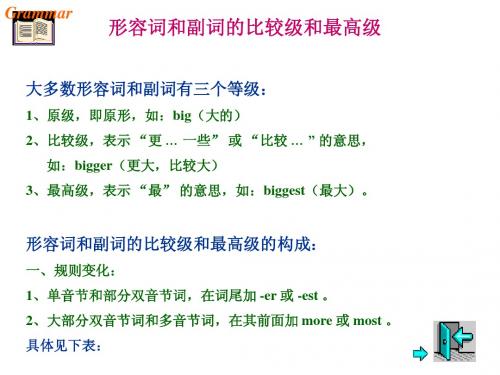
bigger, thinner biggest, thinnest
happier heavier
more beautiful
more careful more expensive more interesting
happiest heaviest
most beautiful
most careful most expensive most interesting
注意:形容词最高级前一定要有定冠词 the,副词最高级可有可无。
Grammar
补充:
1、 类似 slowly, lively 这样的双音节词,虽然也是辅音字母加 y 结尾,但这里的 -ly 是表示副词的后缀,因此比较级和最高级
的构成是在单词前加 more / most.
2、比较级句中的 than 和原级比较句型 as…as 中的第二个 as 都是 连词,引导一个比较(方式)状语从句。 e.g. This book is better than that one (is). He speaks English as well as his teacher (does).
e.g. Joan is just as careful as Kate. Tom walks as fast as Mike. It’s not as (so) warm today as yesterday.
He didn’t come as (so) early as Wanglin.
Grammar
在形容词、 副词前加 more 或 most。
beautiful careful expensive interesting dangerous
more dangerous
形容词副词比较级最高级及用法

IV. Others ①表示不及另一方时,使用“less+原级+than…”
+n. This park is less beautiful than that one. ②比较级和最高级互换(比较时要把自己排除在外。注意比较的范围)
eg. Shanghai is the largest city in China. Shanghai is larger than any other city in China. Shanghai is larger than any city in Africa. Ex: John is the thinnest student in the class. John is thinner than any other student in the class.
4. 汉语比英语难的多. Chinese is much more difficult than English. 5. 他比你跑地快一点儿. He runs a little faster than you. 6. 我父亲比我母亲年长三岁. My father is four three older than my mother. 比较级前可用表示程度的副词修饰,如 a little, a bit ,much ,a lot, even ,four years old等
John is thinner than ③ ** adj.&adv: hard, fast, early, late, high, etc.
in the class.
Task 2 形容词和副词的比较级
1. 我比你瘦. I am thinner than you. 2. 我摘的苹果比你少. I picked fewer apples than you (did). 3. 中国印度.哪个国家更大? Which country is larger,China or India? 4. 我认为语文比数学更有趣. I think Chinese is more interesting than maths.
比较级

• 特殊句型 • ⒈表示"越来越……"的意思: "比较级 + and + 比较 级"或"more and more / less and less + 原级"结 构,与这类结构搭配的常用动词有 grow,get,become等。 • She felt herself becoming more and more nervous. • As the . winter is drawing near,it's getting colder and colder.
• • • • • • • • • • • • • • • • • • • • • •
10、strong—— stronger 11、warm—— warmer 12、fast—— faster 13、quiet—— quieter 14、dark—— Darker 15、bright—— brighter 16、clean—— cleaner 17、young—— younger 18、weak—— weaker 19、thick—— thicker 20、quick—— quicker
• • • • •
• • • • • •
10.nothing less than完全是,和。。。一模一样 11.all the more越发,更加 12. any (the) less较小/更小一些,小的 13. all the better更好,更加 14. so much the better/worse (for sb./sth.)甚 至更好/更坏 15. go one better (than sb./sth.)胜过。。。一 筹 16. more…than…与其说。。。不如说。。。 17. would sooner/rather…than与其。。。宁愿 18. (be) more like…than不像。。。倒像 19. rather…than…/rather than宁可。。。而 不 20. other than除了。。。,除。。。之外
英语比较级和最高级的用法归纳
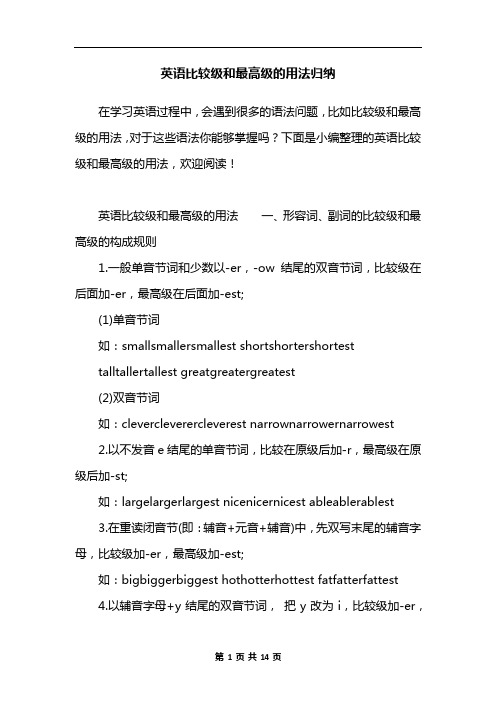
英语比较级和最高级的用法归纳在学习英语过程中,会遇到很多的语法问题,比如比较级和最高级的用法,对于这些语法你能够掌握吗?下面是小编整理的英语比较级和最高级的用法,欢迎阅读!英语比较级和最高级的用法一、形容词、副词的比较级和最高级的构成规则1.一般单音节词和少数以-er,-ow结尾的双音节词,比较级在后面加-er,最高级在后面加-est;(1)单音节词如:smallsmallersmallest shortshortershortesttalltallertallest greatgreatergreatest(2)双音节词如:clevercleverercleverest narrownarrowernarrowest2.以不发音e结尾的单音节词,比较在原级后加-r,最高级在原级后加-st;如:largelargerlargest nicenicernicest ableablerablest3.在重读闭音节(即:辅音+元音+辅音)中,先双写末尾的辅音字母,比较级加-er,最高级加-est;如:bigbiggerbiggest hothotterhottest fatfatterfattest4.以辅音字母+y结尾的双音节词,把y改为i,比较级加-er,最高级加-est;如:easyeasiereasiest heavyheavierheaviestbusybusierbusiest happyhappierhappiest5.其他双音节词和多音节词,比较级在前面加more,最高级在前面加most;如:beautifulmore beautifulmost beautifuldifferentmore differentmost differenteasilymore easilymost easily注意:(1)形容词最高级前通常必须用定冠词the,副词最高级前可不用。
例句:The Sahara is the biggest desert in the world.(2) 形容词most前面没有the,不表示最高级的含义,只表示非常。
形容词副词的比较级最高级用法
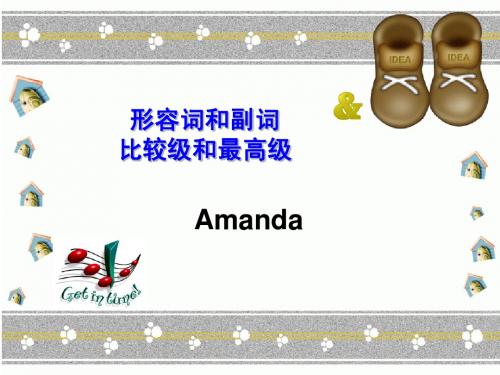
bad / badly / ill – worse – worst
little – less – least far – farther/ further– farthest – furthest old – older/ elder – oldest / eldest
形容词和副词比较级的用法
1.Who runs faster, he or she?
1.Hainan is a very large Island .It is the
largest island in china. (large) second _________
2.Our teacher is as ______ busy as before.(busy).
3.He is ______________ the most careful of us all. (careful)
形容词和副词的最高级的用法
1.表示三者或三者以上比较,可用”Which/Who …+最高 级, A, B or C?”表示. Who is the tallest, Tom , Mike , or Jack?
2.最高级+of +(代词或数词)/ in+ (地点或集体)
Tom is the tallest of the three. Tom runs (the) fastest in our class. 3.序数词修饰最高级 Mike is the second tallest student in our class. 4.one of + 形容词最高级 +名词复数:表示“最…… 之 一” Jack is one of the tallest students in our class.
形容词的比较级的规则变化及用法
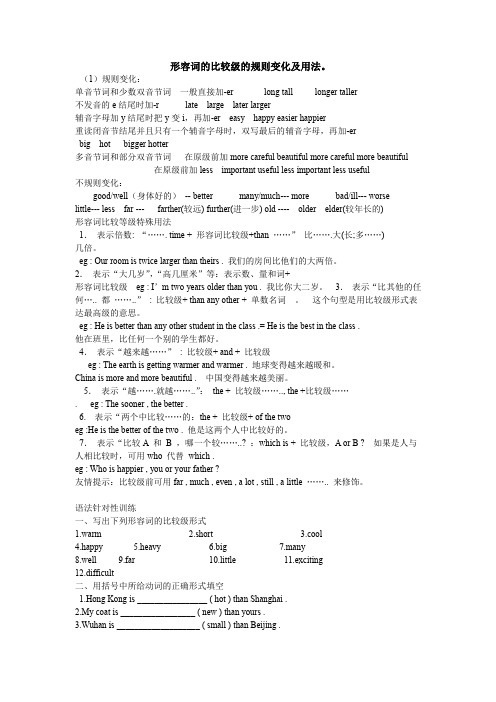
形容词的比较级的规则变化及用法。
(1)规则变化:单音节词和少数双音节词一般直接加-er long tall longer taller不发音的e结尾时加-r late large later larger辅音字母加y结尾时把y变i,再加-er easy happy easier happier重读闭音节结尾并且只有一个辅音字母时,双写最后的辅音字母,再加-erbig hot bigger hotter多音节词和部分双音节词在原级前加more careful beautiful more careful more beautiful在原级前加less important useful less important less useful不规则变化:good/well(身体好的)-- better many/much--- more bad/ill--- worselittle--- less far --- farther(较远) further(进一步) old ---- older elder(较年长的)形容词比较等级特殊用法1.表示倍数: “……. time + 形容词比较级+than ……”比…….大(长;多……)几倍。
eg : Our room is twice larger than theirs . 我们的房间比他们的大两倍。
2.表示“大几岁”,“高几厘米”等:表示数、量和词+形容词比较级eg : I’m two years older than you . 我比你大二岁。
3.表示“比其他的任何….. 都……..”: 比较级+ than any other + 单数名词。
这个句型是用比较级形式表达最高级的意思。
eg : He is better than any other student in the class .= He is the best in the class .他在班里,比任何一个别的学生都好。
比较级
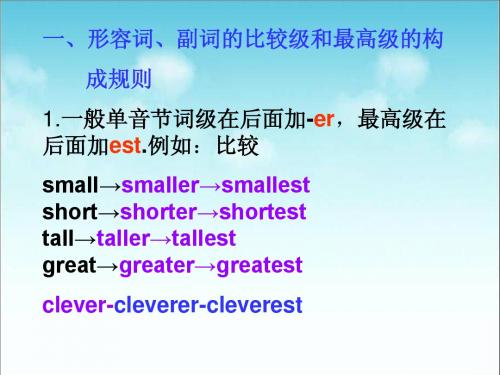
4. 以“辅音字母+y”结尾的双音节词,把y改 为i,比较级加-er,最高级加-est; 如: easy→easier→easiest heavy→heavier→heaviest buer→happiest early- earlier-earliest
9.如果of后面说的是两者,则前边用比较级, 且比较级前边要加the. He is the taller of the two boys. Lucy is the more careful of the twins. It is the more interesting of the two books.
一、形容词、副词的比较级和最高级的构
成规则
1.一般单音节词级在后面加-er,最高级在 后面加est.例如:比较 small→smaller→smallest short→shorter→shortest tall→taller→tallest great→greater→greatest
clever-cleverer-cleverest
1 我的房间比你的房间大。 My room is bigger than yours. 2 Jenny跳舞比Mary好。 Jenny dances better than Mary. 3 我比李明跳的高。 I jump higher than Li Ming. 4 他的英语比我的英语好。 His English is better than mine.
10.可修饰比较级的词
a bit, a little, much, far , a lot , any, even
等 11.One of+ the +最高级+名词复数 (最…..之一) 12.the+序数词+最高级+名词单数 (第几个最…..)
比较级与最高级的用法
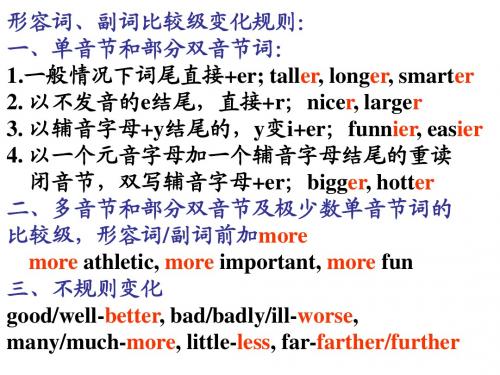
形容词/副词比较级的用法: “A + 谓语动词 +比较级 + than + B” 意思为“A比B 更……”。 This tree is taller than that one. 这棵树比那棵树高。 He runs faster than me. 他跑得比我快。 注意: 1. 在含有连词than的比较级中,前后的比较对象必须是同 一范畴,即同类事物之间的比较。 2. a little, a bit, a lot, much, even, still, far, rather…可修饰 比较级 He is a little more athletic than me. 他比我强壮一点。 My friend is much more outgoing than I. 我朋友比我外向 得多。
3.“比较级 + and + 比较级”或“more and more +原级”表示“越来越……” It becomes warmer and warmer when spring comes. a. 天气越来越凉爽。 cooler and cooler. (cool). It is getting________________ b. 我们的学校变得越来越美丽。 Our school is becoming more and more beautiful. 4. “the +比较级…, the+比较级”,表“越…越…”。 The sooner,the better. 越快越好。 钱你赚得越多,花得越多。 The_____ more money you make, the_____ more y, quite, too, really 等程度副词后用原 级。 I am really busy. We are very tired after the match. 2. as+形容词/副词原级+as… “与…一样…” not so/as+形容词/副词原级+as…“不如……” I go to school as early as you. Chemistry is not so difficult as math.
比较级
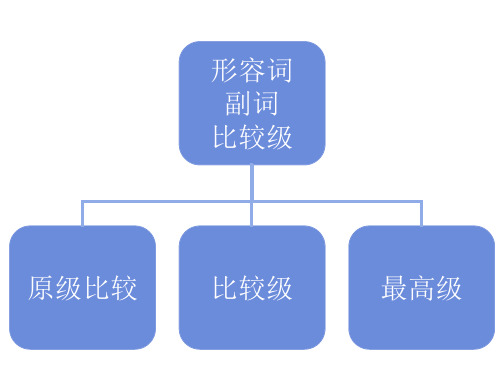
interesting-more interesting-the most interesting
difficult-more difficult-the most difficult
beautiful-more beautiful-the most beautiful
expensive-more expensive-the most expensive
不规则变化
1.good/well-better-best 2.bad/badly/ill(坏)-worse-worst 3.many-more-most 4.little-less-least
5.far-farther-farthest(具体) -further-furthest(抽象)
6.old-older-oldest(无血缘关系) -elder-eldest(有血缘关系)
一.规则变化
1.单音节词和少数多音节词
(1)一般直接加-er,-est:long-longer-longest
narrow- narrower- narrowest
clever-cleverer-cleverest
(2)以不发音e结尾,加-r,-st: wide-wider-widest
late-later-latest
eg: The more,the better. 越多越好。 6.比较级的否定形式表示最高级含义。
eg:I can't agree more. 我不能更同意了。 我再同意不过了。
修饰比较级的副词
• ...得多
much, a lot, far
• ...点儿
a little, a bit, any
• 甚至
even
以辅音字母加y结尾的形容词变比较级
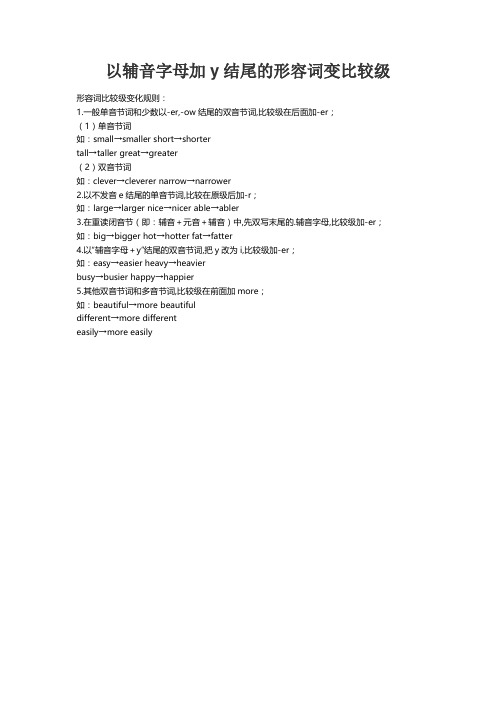
以辅音字母加y结尾的形容词变比较级
形容词比较级变化规则:
1.一般单音节词和少数以-er,-ow结尾的双音节词,比较级在后面加-er;
(1)单音节词
如:small→smaller short→shorter
tall→taller great→greater
(2)双音节词
如:clever→cleverer narrow→narrower
2.以不发音e结尾的单音节词,比较在原级后加-r;
如:large→larger nice→nicer able→abler
3.在重读闭音节(即:辅音+元音+辅音)中,先双写末尾的.辅音字母,比较级加-er;如:big→bigger hot→hotter fat→fatter
4.以“辅音字母+y”结尾的双音节词,把y改为i,比较级加-er;
如:easy→easier heavy→heavier
busy→busier happy→happier
5.其他双音节词和多音节词,比较级在前面加more;
如:beautiful→more beautiful
different→more diff erent
easily→more easily。
